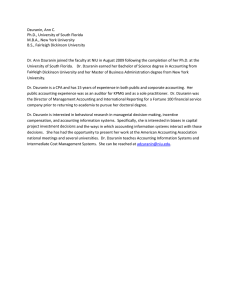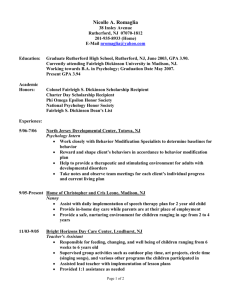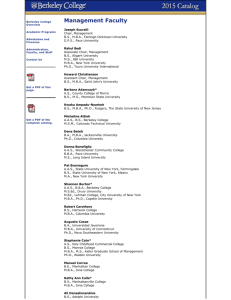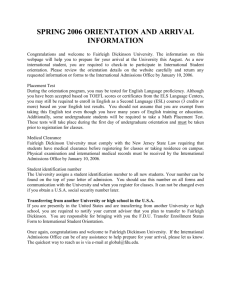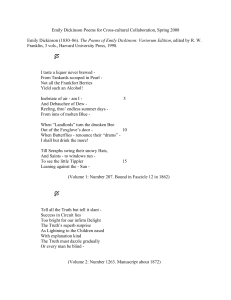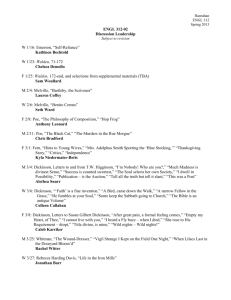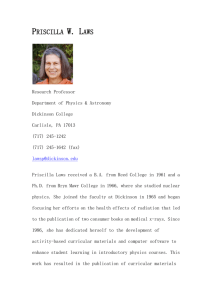Document 11580321
advertisement
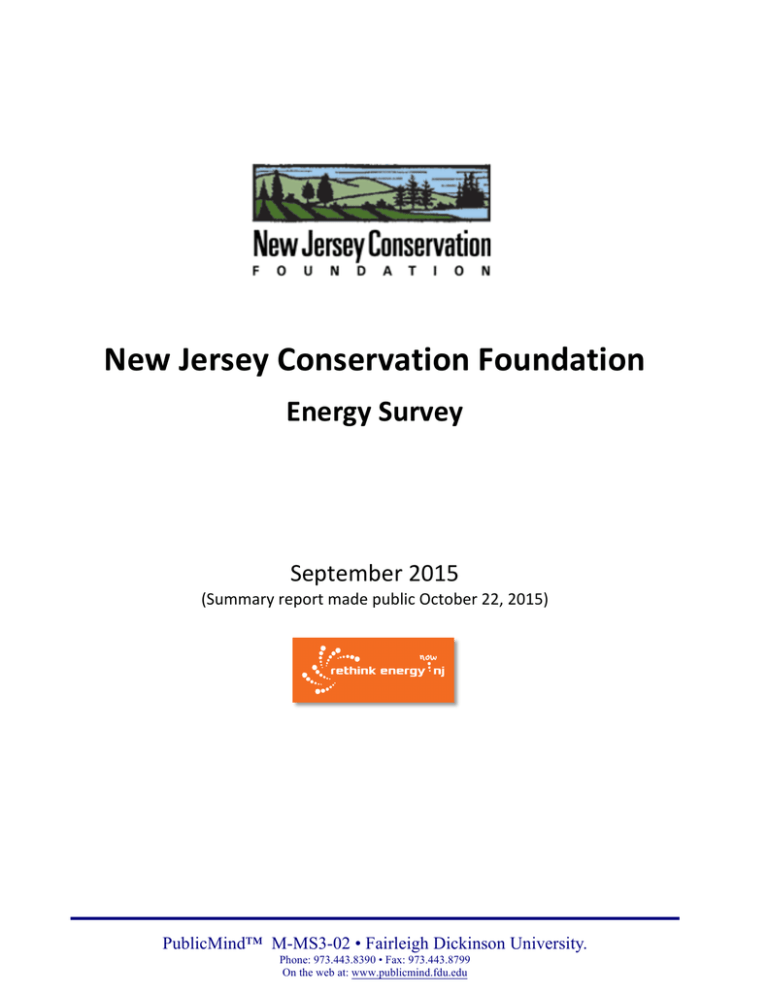
New Jersey Conservation Foundation Energy Survey September 2015 (Summary report made public October 22, 2015) PublicMind™ M-MS3-02 • Fairleigh Dickinson University. Phone: 973.443.8390 • Fax: 973.443.8799 On the web at: www.publicmind.fdu.edu Fairleigh Dickinson University’s PublicMind Table of Contents I. EXECUTIVE SUMMARY …………… ............................................................ ……………..3 II. DETAILED RESEARCH RESULTS ............................................................................ 5 III. DETAILED RESEARCH RESULTS -­‐ SAMPLE CHARACTERISTICS ........................... 22 APPENDIX ............................................................................................................... 24 QUESTIONNAIRE ............................................................................................ A Fairleigh Dickinson University’s PublicMind Poll TM 2 Fairleigh Dickinson University’s PublicMind I. Executive Summary About this study Fairleigh Dickinson University’s PublicMind conducted a telephone survey of randomly selected registered voters in New Jersey on behalf of the New Jersey Conservation Foundation. The study’s main objective is to measure the awareness of, and attitudes towards various energy sources. In addition, the study measured awareness and perceptions of natural gas pipelines proposed to run within the state. PublicMind utilized a Random Digit Dialing (RDD) telephone method based on a registered voter sample list to complete a total of 709 telephone surveys with New Jersey registered voters. The RDD sampling was employed to ensure a valid random sampling of registered voters across the state. To approximate the current make-­‐up of cell phones in the state, PublicMind completed 45% of the surveys with cell phone participants, and 55% via landline phones. Once all surveys were completed, the data were mathematically weighted to match the known demographics of age, gender and race of New Jersey’s registered voters. With a randomly selected sample of 709 registered voters in New Jersey, one can be 95 percent confident that the margin of error (MoE) is +/-­‐ 3.7 percentage points. The margin of error for subgroups is larger and varies by the size of that subgroup. All surveys were completed between September 18th and September 24th, 2015 and averaged just under 10 minutes in length. The results are summarized below. In general, registered voters in this study are very supportive of renewable energy initiatives, and support the state moving forward more rapidly than it is currently. As a general statement, across the issues, women, younger and non-­‐white respondents, as well as self-­‐identified Democrats are more supportive than their respective cohorts, although support for renewable energy was strong among all demographic groups. These demographic differences are consistent with the general trend in public opinion on environmental issues. Overall, more believe solar (48%) is the most important energy source to New Jersey's future. This was true across all demographics. Natural gas was the second most frequently cited source at 27%. Overall 93% believe clean/green energy is very or somewhat important to the overall health of New Jersey. Given a choice of two opposing statements, two-­‐thirds (62%) believe pipelines threaten NJ, while only a third (33%) believe they help. Fairleigh Dickinson University’s PublicMind Poll TM 3 Fairleigh Dickinson University’s PublicMind Residents understand that solar and wind (95% and 88%) are clean. However, there is more confusion regarding whether natural gas (51%) and nuclear energy (31%) should be considered "clean" or "renewable" energy sources. The vast majority (79%) believe the state should invest more in developing clean energy sources than fossil fuels (17%). The remaining 4 percent are unsure. Most (62%) say the state is moving too slowly on developing and adopting clean energy sources. A quarter (23%) say the pace is just right. Overall, 4 in 5 (80%) favor New Jersey moving to the higher goal of 30% of its energy coming from renewable sources by 2020. Similar numbers (78%) favor a goal of having an even higher state target of 80% by 2050. The majority (77%) are very or somewhat concerned with climate change. About two-­‐ thirds (66%) believe state officials should be doing more to address it. When asked about a variety of potential risks linked to pipeline development in the state, similar numbers say they would be “very” or “somewhat concerned” with each of the following: The seizure of private property for private companies 87% The impact to natural areas and wildlife habitats 85% The risks to air and water quality 84% The safety risks associated with ruptures, leaks, or explosions 83% The use of taxpayer funded and protected open space for pipelines 83% The likelihood that the gas would be exported outside the state 70% Fairleigh Dickinson University’s PublicMind Poll TM 4 Fairleigh Dickinson University’s PublicMind II. Detailed Results – 1. Which source do you think is most important to New Jersey’s energy future? A plurality (48%) say solar is the most important to New Jersey’s energy future; and this holds true across all demographics. Despite this, significant gender, age, and party ID differences exist. Natural gas (27%) ranks second, and nuclear (7%) is the third most cited source. More men (13%) than women (2%) selected nuclear as most important. Chart 1 Age 18-­‐34 35-­‐59 60+ 52% 55% 38% 23% 24% 33% 9% 5% 9% 2% 3% 6% 7% 8% 8% 0% 1% 1% 1% 1% 1% 5% 3% 3% Solar Natural gas Nuclear Oil Wind Coal Other Unsure Party ID Solar Natural gas Nuclear Oil Wind Coal Other Unsure Dem 56% 21% 5% 5% 10% 1% 1% 3% In 49% 25% 8% 3% 8% 0% 1% 4% Rep 37% 33% 11% 4% 6% 2% 2% 4% Fairleigh Dickinson University’s PublicMind Poll TM 5 Fairleigh Dickinson University’s PublicMind 2. How important do you believe investing in clean/renewable energy sources are to the overall health of the state of New Jersey? Overall, 93 percent believe investing in clean/renewable energy is very or somewhat important. More women than men (96% vs 90%), more in the 18-­‐34 (97%) age cohort than in the 60+ (89%), and more Democrats (99%) than Republicans (87%) or Independents (92%) believe it to be important. Chart 2 Very important Somewhat important Not very important Not at all important 18-­‐34 76% 21% 1% 1% Age 35-­‐59 65% 28% 4% 2% 60+ 59% 30% 7% 3% Very important Somewhat important Not very important Not at all important Dem. 83% 16% 0% 1% Party ID Ind. 61% 32% 4% 2% Rep. 46% 41% 9% 3% Fairleigh Dickinson University’s PublicMind Poll TM 6 Fairleigh Dickinson University’s PublicMind 3. In order to meet New Jersey's energy needs, do you believe the state should invest more in clean/green/renewable energy sources, like wind and solar, or more in fossil fuels, like oil and natural gas, through the construction of additional pipelines? Overall, 4 in 5 (79%) believe the state should invest more in clean energy sources than in fossil fuels. While differences are seen across age, region, and party ID, in all cases clean/green/renewable energy is the overwhelmingly favored choice. For this question and Q7, Q8 and Q9, respondents were presented with the term they viewed most favorably. Chart 3 Age 18-­‐34 35-­‐59 60+ Green sources Fossil fuels 86% 12% 81% 17% 72% 21% Unsure 2% 2% 5% Party ID Dem Ind Rep Green sources 89% 77% 68% Fossil fuels 9% 17% 27% Unsure 2% 5% 3% Fairleigh Dickinson University’s PublicMind Poll TM 7 Fairleigh Dickinson University’s PublicMind 4. How do you rate the pace at which our state is developing and adopting clean/green/renewable alternatives? About 3 in 5 (62%) say New Jersey is moving too slowly in its efforts toward developing clean energy alternatives. A quarter (23%) believe the state is moving at the correct pace. The only significant differences of note are more Democrats (73%) than Republicans (49%) or Independents (62%) say NJ is moving too slowly. Conversely, Independents (24%) and Republicans (34%) are more likely than Democrats (16%) to say the state is proceeding at the appropriate rate. Chart 4 Age 18-­‐34 35-­‐59 60+ Too slow 59% 62% 65% Too fast 1% 3% 3% Just right 29% 22% 22% Unsure 11% 14% 9% Party ID Dem Ind Rep Too slow Too fast Just right Unsure 73% 2% 16% 8% 62% 2% 24% 11% 49% 4% 34% 12% Fairleigh Dickinson University’s PublicMind Poll TM 8 Fairleigh Dickinson University’s PublicMind 5. As you may or may not know, New Jersey's goal is to have 22% of its energy coming from clean/green/renewable sources such as wind and solar by 2020. Would you favor or oppose New Jersey setting a higher goal of 30% of energy from these sources by 2020? Overall, 80 percent favor setting a goal of having 30 percent of the state’s energy coming from clean sources by 2020 -­‐ 50 percent strongly favor the measure. More women (84%) than men (77%) and more Democrats (93%) than Republicans (69%) or Independents (75%) support the measure; while fewer older respondents (72%) than younger (91%, 82%), would support it. Chart 5 Strongly Favor Favor Oppose Strongly Oppose Unsure 18-­‐34 56% 35% 2% 7% 1% Age 35-­‐59 53% 29% 5% 9% 3% 60+ 44% 28% 10% 10% 7% Dem Party ID Ind Rep Strongly Favor Favor Oppose Strongly Oppose 60% 33% 1% 4% 50% 25% 9% 10% 34% 34% 10% 16% Unsure 2% 5% 4% Fairleigh Dickinson University’s PublicMind Poll TM 9 Fairleigh Dickinson University’s PublicMind 6. A bill pending in the NJ Legislature would require 80 percent of the state's electricity to come from renewable energy by 2050. Do you favor or oppose this goal? Similarly, most (78%) favor a bill requiring 80 percent of New Jersey’s energy to come from renewable energy sources by 2050. The demographic differences virtually mirror those in the 2020 goal question. Chart 6 Age 18-­‐34 35-­‐59 60+ Strongly Favor 46% 50% 46% Favor 43% 28% 25% Oppose 3% 8% 10% Strongly Oppose 4% 8% 9% Unsure 2% 5% 9% Strongly Favor Favor Oppose Strongly Oppose Unsure Dem 57% 32% 3% 4% 3% Party ID Ind 46% 25% 11% 9% 8% Rep 35% 36% 12% 10% 6% Fairleigh Dickinson University’s PublicMind Poll TM 10 Fairleigh Dickinson University’s PublicMind 7. Do you believe elected officials in New Jersey should be doing MORE or LESS to address climate change, or is enough being done? Overall, two thirds (66%) believe elected officials should be doing more to address climate change in the state. Once again, more women (70%) than men (62%), more Democrats (85%) than Republicans (39%) or Independents (66%), and fewer from the Northwest (50%) believe officials should be doing more than they are. Chart 7 Age 18-­‐34 35-­‐59 60+ More 69% 66% 63% Less 1% 6% 11% Enough being done 22% 20% 20% Unsure 7% 7% 5% More Less Enough being done Unsure Dem 85% 2% 9% 4% Party ID Ind 66% 7% 19% 8% Rep 39% 14% 40% 7% Fairleigh Dickinson University’s PublicMind Poll TM 11 Fairleigh Dickinson University’s PublicMind 8. How would you describe your feelings toward the effects of climate change in New Jersey? Overall, three quarters (77%) are very or somewhat concerned with climate change in New Jersey. While the concerns are high across all demographic groups, the differences remain consistent between men (73%) and women (80%), Democrats (92%) versus Independents (80%) and Republicans (53%). Chart 11 Very concerned Somewhat concerned Not very concerned Not at all concerned 18-­‐34 33% 45% 12% 10% 35-­‐59 34% 44% 9% 13% 60+ 35% 41% 11% 13% Party ID Dem Ind Rep Very concerned 48% 36% 12% Somewhat concerned 44% 44% 41% Not very concerned 5% 8% 22% Not at all concerned 3% 11% 25% Fairleigh Dickinson University’s PublicMind Poll TM 12 Fairleigh Dickinson University’s PublicMind 9. How concerned are you, if at all, about the potential impacts of these pipelines to New Jersey? When asked a general question regarding concern about pipeline impact in New Jersey, 7 in 10 (69%) said they were “somewhat” or “very” concerned. Once again, women (76%) were more concerned than men (62%), those 18-­‐34 (76%) were more concerned than those 60+ (68%), Democrats (83%) were more concerned than Republicans (54%) or Independents (66%). Chart 9 Age 18-­‐34 35-­‐59 Very concerned 29% 30% Somewhat concerned 47% 37% Not very concerned 19% 18% Not at all concerned 3% 12% Not sure 2% 2% 60+ 30% 38% 14% 15% 3% Very concerned Somewhat concerned Not very concerned Not at all concerned Not sure Party ID Dem Ind Rep 38% 30% 17% 45% 36% 37% 9% 21% 23% 7% 9% 21% 1% 3% 3% Fairleigh Dickinson University’s PublicMind Poll TM 13 Fairleigh Dickinson University’s PublicMind 10. Concern about the pipeline development to: SUMMARY When asked how concerned they are regarding seven specific potential issues with the proposed pipelines, data were strikingly similar across all measures. Only the concern for gas being shipped outside of the state was significantly lower from the others, although there is still significant concern (70%). In virtually all instances, women expressed more concern than men, younger more than older, Democrats more than Republicans or Independents. Chart 10 Fairleigh Dickinson University’s PublicMind Poll TM 14 Fairleigh Dickinson University’s PublicMind 10a. Concern about the pipeline development to: The risks to air and water quality Chart 10a Age 18-­‐34 35-­‐59 60+ Very Concerned 67% 61% 57% Somewhat Concerned 26% 23% 21% Not Very Concerned 5% 7% 8% Not at all Concerned 2% 7% 13% Party ID Ind Rep Dem Very Concerned Somewhat Concerned Not Very Concerned 72% 22% 3% 62% 21% 9% 41% 30% 11% Not at all Concerned 3% 6% 18% Fairleigh Dickinson University’s PublicMind Poll TM 15 Fairleigh Dickinson University’s PublicMind 10b. Concern about the pipeline development to: The impact to natural areas and wildlife habitats? Chart 10b Age 18-­‐34 35-­‐59 60+ Very Concerned 59% 60% 55% Somewhat Concerned 33% 25% 26% Not Very Concerned 5% 8% 9% Not at all Concerned 3% 7% 9% Dem Very Concerned Somewhat Concerned Not Very Concerned Not at all Concerned 66% 29% 4% 1% Party ID Ind Rep 57% 28% 8% 6% 50% 24% 13% 13% Fairleigh Dickinson University’s PublicMind Poll TM 16 Fairleigh Dickinson University’s PublicMind 10c. Concern about the pipeline development to: The safety risks associated with ruptures, leaks, or explosions? Chart 10c Age 18-­‐34 35-­‐59 60+ Very Concerned 64% 61% 59% Somewhat Concerned 26% 22% 20% Not Very Concerned 7% 9% 9% Not at all Concerned 3% 8% 11% Dem Very Concerned Somewhat Concerned Not Very Concerned Not at all Concerned 74% 20% 4% 1% Party ID Ind Rep 59% 22% 10% 9% 47% 24% 14% 15% Fairleigh Dickinson University’s PublicMind Poll TM 17 Fairleigh Dickinson University’s PublicMind 10d. Concern about the pipeline development to: The seizure of private property for private companies? Chart 10d Age 18-­‐34 35-­‐59 60+ Very Concerned 52% 62% 69% Somewhat Concerned 33% 23% 22% Not Very Concerned 10% 5% 5% Not at all Concerned 6% 9% 2% Unsure 0% 1% 2% Party ID Dem Ind Rep Very Concerned Somewhat Concerned Not Very Concerned Not at all Concerned Unsure 58% 29% 6% 6% 1% 67% 22% 6% 4% 1% 66% 20% 6% 6% 1% Fairleigh Dickinson University’s PublicMind Poll TM 18 Fairleigh Dickinson University’s PublicMind 10e. Concern about the pipeline development to: The use of taxpayer funded and protected open space for construction of pipelines? Chart 10e Age 18-­‐34 35-­‐59 60+ Very Concerned 49% 37% 10% 4% 0% 52% 32% 8% 8% 1% 52% 29% 9% 7% 2% Somewhat Concerned Not Very Concerned Not at all Concerned Unsure Very Concerned Somewhat Concerned Not Very Concerned Not at all Concerned Unsure Party ID Dem Ind 60% 50% 30% 34% 6% 8% 4% 4% 0% 3% Rep 38% 34% 13% 14% 1% Fairleigh Dickinson University’s PublicMind Poll TM 19 Fairleigh Dickinson University’s PublicMind 10f. Concern about the pipeline development to: The likelihood that the gas shipped through NJ pipelines would be exported outside the state rather than? Chart 10f Age 18-­‐34 35-­‐59 60+ Very Concerned 33% 35% 23% 9% 1% 40% 32% 14% 12% 2% 46% 26% 12% 14% 3% Dem 43% 36% 13% 6% 1% Party ID Ind 39% 27% 18% 14% 3% Rep 36% 28% 16% 18% 2% Somewhat Concerned Not Very Concerned Not at all Concerned Unsure Very Concerned Somewhat Concerned Not Very Concerned Not at all Concerned Unsure Fairleigh Dickinson University’s PublicMind Poll TM 20 Fairleigh Dickinson University’s PublicMind 11. Which of the following statements best describes how you feel, even if neither is perfect? When presented with two opposite statements regarding the proposed pipelines, the majority (62%) chose the statement indicating “pipelines threaten preserved lands, our water supplies, and public health and safety. New Jersey should instead adopt clean sources of energy like wind and solar that will benefit our environment and economy.” A third (33%) selected the option “pipelines are safe, create jobs and bring cheap and reliable natural gas that will benefit New Jersey businesses and consumers.” The standard demographic differences were observed on this question. Chart 11 Age 18-­‐34 35-­‐59 60+ Pipelines help 26% 32% 38% Pipelines threaten 72% 63% 55% Unsure 2% 5% 6% Pipelines help Pipelines threaten Unsure Dem 18% 79% 2% Party ID Ind 33% 61% 5% Rep 54% 40% 6% Fairleigh Dickinson University’s PublicMind Poll TM 21 Fairleigh Dickinson University’s PublicMind III. Sample Characteristics Gender Male 51% Female 49% Age 18-­‐34 23% 35-­‐59 42% 60+ 34% Refused 1% Party ID Democrat 37% Republican 26% Independent 32% Other/Refused 5% Education Some HS 1% High school Some college or Community college Graduated from a 4 year college Graduate school 14% 24% 37% 24% Employment Full-­‐time 55% Part-­‐time 14% Retired 22% Not employed outside the home 8% DK/Ref 0% Fairleigh Dickinson University’s PublicMind Poll TM 22 Fairleigh Dickinson University’s PublicMind Ethnicity White 68% African American 14% Hispanic/Latino 13% Asian 3% Other 0% Ref 3% Anyone in Household part of the Public Employee Pension System No 72% Yes -­‐ Myself 17% Yes – Someone else 10% Interview Completed Via: Land-­‐line phone 55% Cell phone 45% Fairleigh Dickinson University’s PublicMind Poll TM 23 Fairleigh Dickinson University’s PublicMind APPENDIX A Questionnaire Fairleigh Dickinson University’s PublicMind Poll TM 24 Fairleigh Dickinson University’s PublicMind New Jersey Conservation Foundation Select Questions Q1. Which source do you think is most important to New Jersey’s energy future? (Rotate, Read List, stop when respondent indicates a choice) 1 Solar 2 Wind 3 Natural gas 4 Oil 5 Nuclear 6 Coal 7 Other (vol) [specify] 8 DK (vol) 9 Refused (vol) Q2. How important do you believe investing in [split] clean energy/renewable energy sources is to the overall health of the state of New Jersey? 1 Very important 2 Somewhat important 3 Not very important 4 Not at all important 8 DK (vol) 9 Refused (vol) Q3. In order to meet New Jersey’s energy needs, do you believe the state should invest more in clean/green/renewable energy sources, like wind and solar, or more in fossil fuels, like oil and natural gas, through the construction of additional pipelines? 1 Renewable sources 2 Fossil fuels 8 DK (vol) 9 Refused (vol) Q4. How do you rate the pace at which our state is developing and adopting clean/green/renewable alternatives? Would you say it is… 1 Too slow 2 Too fast 3 Just right 8 DK (vol) 9 Refused (vol) Fairleigh Dickinson University’s PublicMind Poll TM 25 Fairleigh Dickinson University’s PublicMind Q5. As you may or may not know, New Jersey’s goal is to have 22% of its energy coming from celan/green/renewable sources such as wind and solar by 2020. Would you favor or oppose New Jersey setting a higher goal of 30% of energy from these sources by 2020? Would that be…? 1. Favor 2. Strongly Favor 3. Oppose 4. Strongly Oppose 8. DK (vol) 9. Refused (vol) Q6. A bill pending in the NJ Legislature would require 80 percent of the state's electricity to come from renewable energy by 2050. Do you favor or oppose this goal? 1. Favor 2. Strongly Favor 3. Oppose 4. Strongly Oppose 8. DK (vol) 9. Refused (vol) Q7. Do you believe elected officials in New Jersey should be doing [rotate] more or less to address climate change, or is enough being done? 1 More 2 Less 3 Enough being done 8 DK (vol) 9 Refused (vol) Q8. How would you describe your feelings toward the effects of climate change in New Jersey? Are you. 1 Very concerned 2 Somewhat concerned 3 Not very concerned 4 Not at all concerned 8 DK (vol) 9 Refused (vol) Fairleigh Dickinson University’s PublicMind Poll TM 26 Fairleigh Dickinson University’s PublicMind Q9. How concerned are you, if at all, about the potential impacts of these pipelines to New Jersey? Are you… 1 Very concerned 2 Somewhat concerned 3 Not very concerned 4 Not at all concerned 8 DK (vol) 9 Refused (vol) Q10. And, in general, how would you describe your feelings toward each of the following potential consequences of pipeline development in New Jersey? [Rotate Q14A through Q14F] Q10a The risks to air and water quality Q10b The impact to natural areas and wildlife habitats Q10c The safety risks associated with ruptures, leaks, or explosions Q10d The seizure of private property for [private/big energy] companies (split sample) Q10e The use of taxpayer funded and protected open space for construction of pipelines Q10f The likelihood that the gas shipped through NJ pipelines would be exported outside the state rather than used in New Jersey 1 Very concerned 2 Somewhat concerned 3 Not very concerned 4 Not at all concerned 8 DK (vol) 9 Refused (vol) Q11. Which of the following statements best describes how you feel, even if neither is perfect [rotate]: Pipelines are safe, create jobs and bring cheap and reliable natural gas that will benefit New Jersey businesses and consumers OR Pipelines threaten preserved lands, our water supplies, and public health and safety. New Jersey should instead develop clean sources of energy like wind and solar that will benefit our environment and economy. 1 Pipelines help 2 Pipelines threaten 8 DK (vol) 9 Refused (vol) Fairleigh Dickinson University’s PublicMind Poll TM 27 Fairleigh Dickinson University’s PublicMind Finally, just some questions about yourself… D1 Regardless of who you might vote for, do you consider yourself a….ROTATE… Democrat, a Republican, or an Independent? 1 Democrat 2 Republican 3 Independent [If Independent, ask D1b] 4 Other [DON’T READ] 8 Don’t Know [DON’T READ] 9 Ref [DON’T READ] D1b Which way do you lean? 1 Democrat 2 Republican 3 Neither 8 DK (Vol) D2. And what’s the highest level of education you’ve completed so far…PROMPT UNTIL ANSWERED ? 1 Some high school 2 High school 3 Some college or graduated from a community college 4 Graduated from a four year college 5 Graduate school 8 DK (vol) 9 Ref (vol) D3. Are you currently employed full time, part time, or are you retired or not employed outside the home? 1 FT Ask D4A 2 PT Ask D4A 3 Retired 4 Not employed outside the home 8 DK (vol) 9 Ref (vol) D4. Gender (from observation) 1 Male 2 Female Fairleigh Dickinson University’s PublicMind Poll TM 28 Fairleigh Dickinson University’s PublicMind D5. Is anyone in your household part of the public employee pension system—for New Jersey state, county or local government or a public school district? [If “yes,” ASK: “Is that person yourself or someone else?”] 1 Yes, respondent 2 Yes, household 3 No 8 DK (vol) 9 Ref (vol) D6. County code [break by region] D7. What year were you born? IF REF, ASK “which age group do you fall into… 18-­‐34, 35-­‐59, 60+ ? D8. In addition to being American, would you say you’re… ? [Prompt as necessary] 1 White [INTERVIEWER INCLUDE: Irish, German, Polish, Italian, and all Europeans] 2 African-­‐American/black 3 Asian-­‐American [INCLUDES: Indian, Pakistani, Indian, Arab, Chinese, Japanese, etc.] 4 Hispanic/Latin American 5 Other [vol] 9 Ref. PROMPT: THANKS SO MUCH FOR YOUR TIME! Fairleigh Dickinson University’s PublicMind Poll TM 29
